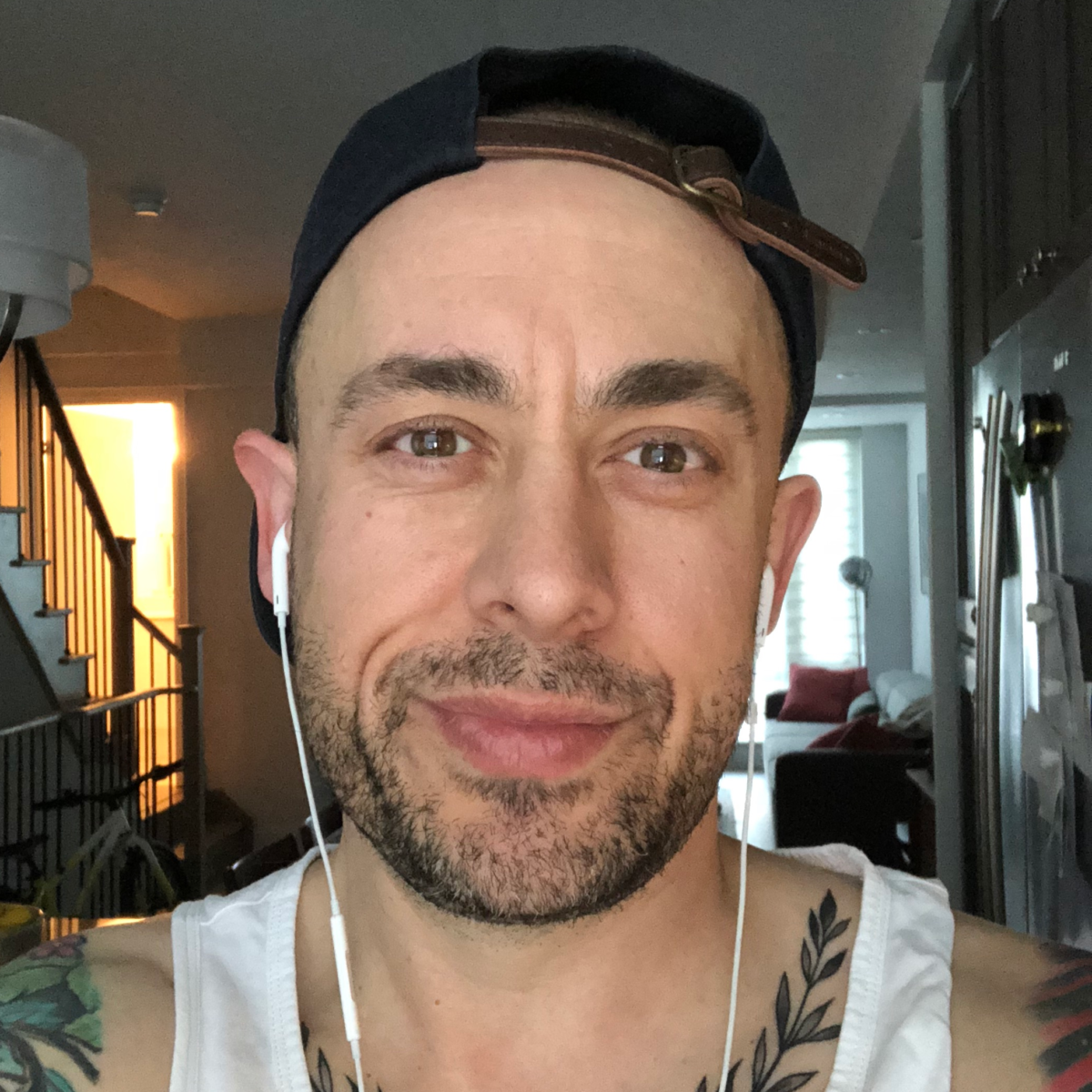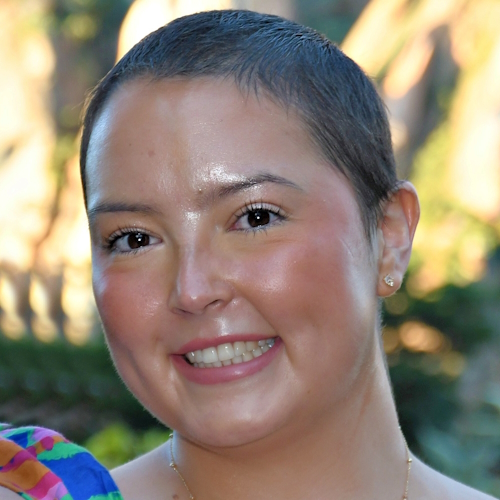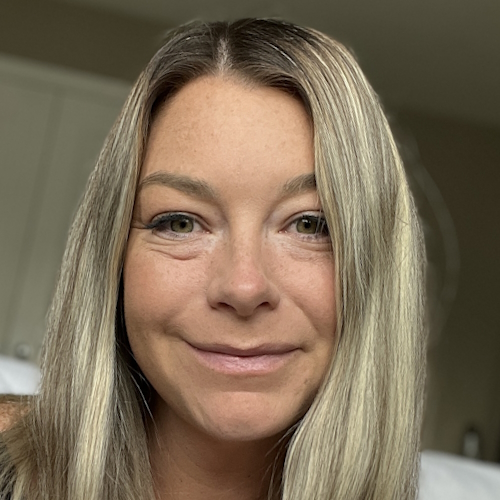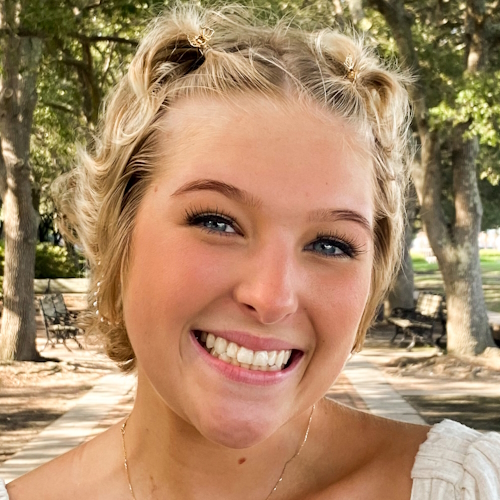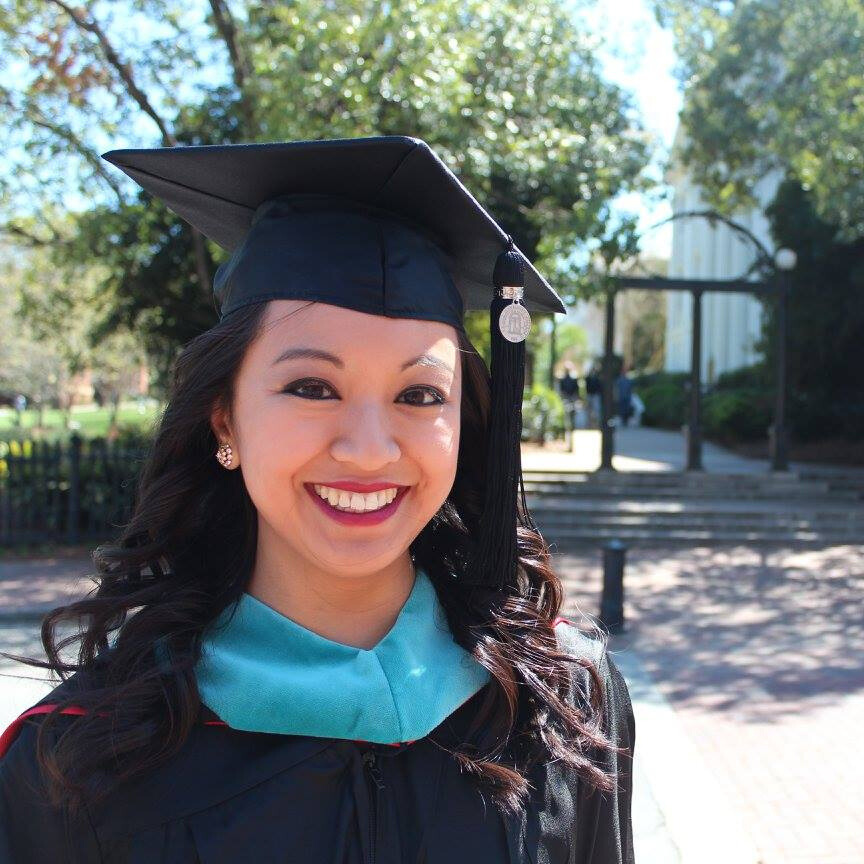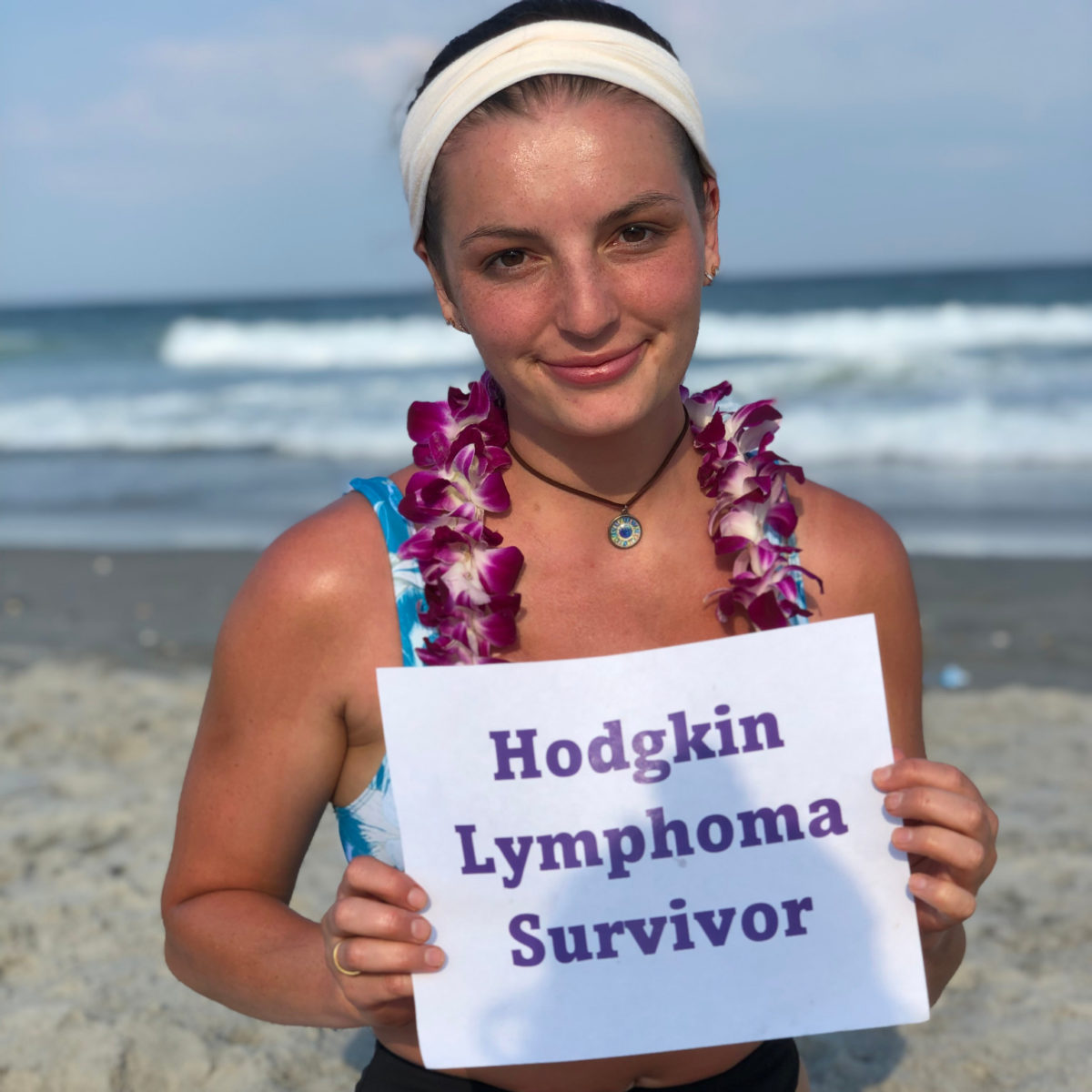Jason’s Stage 2A Classical Hodgkin’s Lymphoma Story
Jason shares his stage 2 Hodgkin’s lymphoma story and details of his treatment: ABVD chemotherapy and radiation therapy. Jason also highlights the importance of self-advocacy and taking care of mental health.
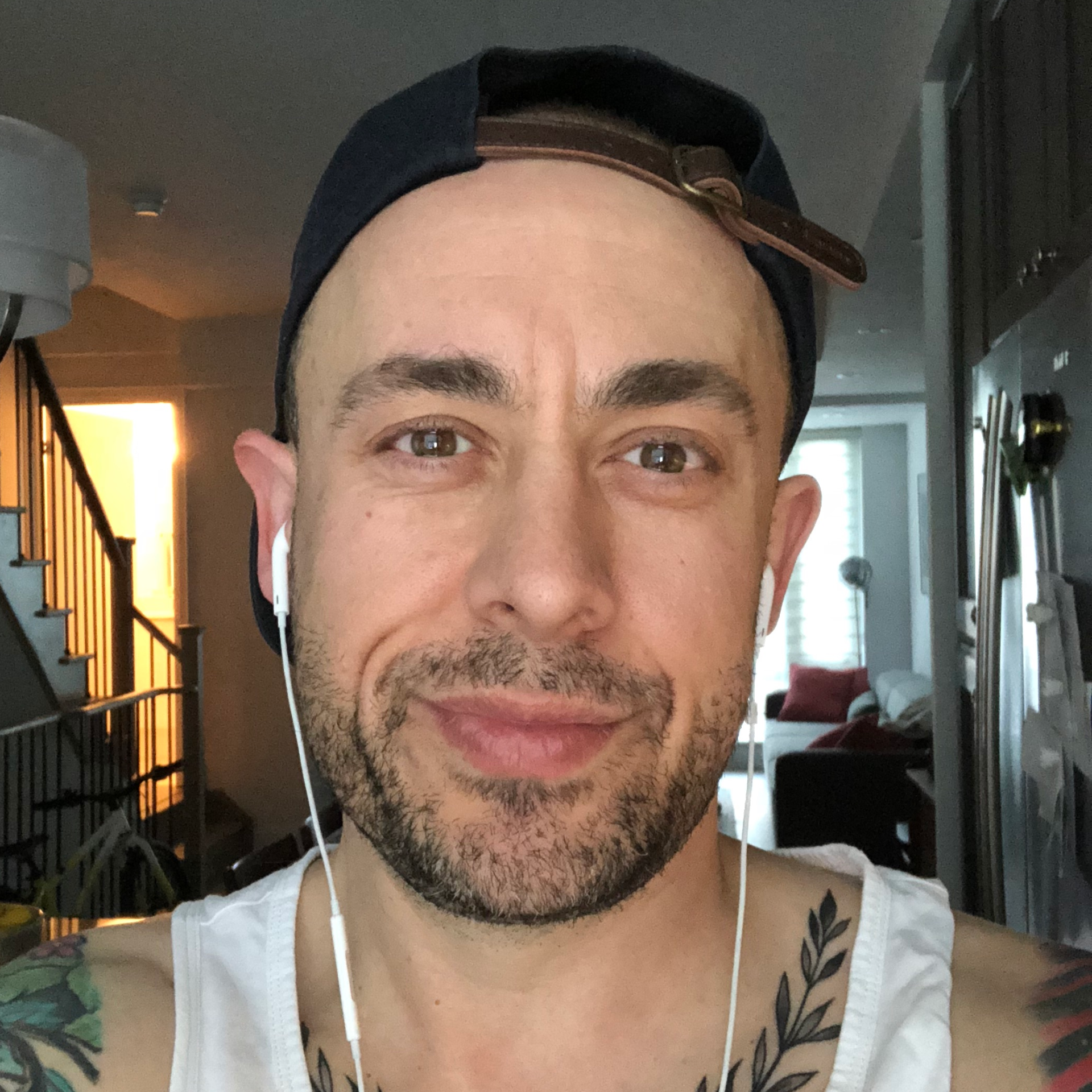
- Name: Jason F.
- Diagnosis (DX)
- Hodgkin’s lymphoma
- Stage 2A
- Age at DX: 39 years old
- 1st Symptoms
- Shortness of breath (already asthmatic)
- Itchiness on leg
- Feeling generally unwell
- Treatment
- ABVD Chemotherapy
- 6 cycles, 2 per cycle, 12 total infusions (outpatient)
- Radiation therapy
- 18 sessions
- ABVD Chemotherapy

- Video: Jason on How He Got Diagnosed
- 1st Symptoms, Scans and Tests
- What were your 1st symptoms?
- Your breathing test came back fine
- Describe the sudden symptoms changes that forced you to go to the ER
- What happened at the ER?
- Processing the possibility of cancer
- Spending the days waiting in the hospital “hallway medicine”
- How would you rate pain tolerance?
- Describe the biopsy
- Describe the ultrasound
- How were the scans?
- Describe the CT scan
- Describe the PET scan
- How did you pass the time in the hospital stay?
- What was the hardest point during this time?
- How did you tell your kids about the cancer?
- How old were your kids at the time?
- How did you process the cancer diagnosis?
- What were the first treatment decisions?
- Did you break the news to loved ones?
- Video: ABVD Chemotherapy & Radiation
- ABVD Chemotherapy & Side Effects
- How did the oncologist describe your treatment plan?
- Warning: you may get sick of your favorite foods
- Chemo nurses helped prep you for treatment
- Describe the ABVD chemo infusions
- Did you get a port or PICC line?
- Did you like the PICC line?
- How did you maneuver with the PICC line?
- Describe the ABVD chemo side effects
- What helped combat some of the side effects?
- Describe the hair loss
- Describe experiencing the bleomycin lung toxicity
- When did you learn you had no evidence of disease (NED)?
- Radiation Therapy
- Video: Jason's on Navigating Life with Cancer
- Reflections: Navigating Life with Cancer
- Being your own advocate as a patient
- How has it been dealing with survivorship?
- The physical recovery was easier than the mental health
- How did you move forward with your mental health?
- How did cancer impact your relationships?
- Your mom was diagnosed with lung cancer shortly after your diagnosis
- How did you process the grief as you went through treatment?
- Last message to other people dealing with cancer
This interview has been edited for clarity. This is not medical advice. Please consult with your healthcare provider for treatment decisions.
I feel better than ever in some ways. Going through what I went through definitely put me on a journey to make sure my health is always now my number one priority in life.
Jason F.
Video: Jason on How He Got Diagnosed
1st Symptoms, Scans and Tests
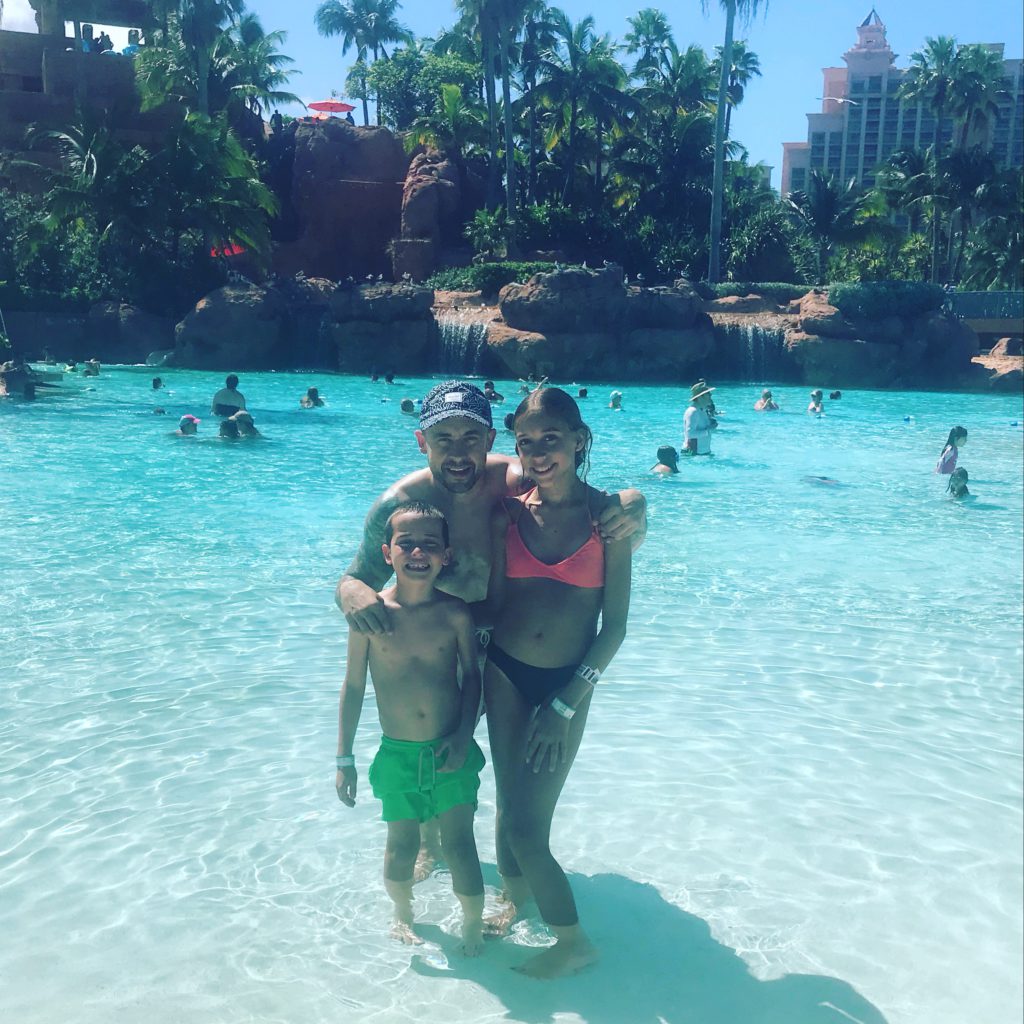
What were your 1st symptoms?
It seems like a lifetime ago to look at that picture. It was on a family trip in the Bahamas with my then-wife and kids. I felt generally unwell. I had injured myself, scraped myself getting out of the pool, and it took about a month to heal.
It didn’t feel or seem right, not like anything I’d ever experienced before. Even in the way that it healed didn’t seem right.
I’ve always been a sufferer of asthma my whole life. During that time, I also noticed my breathing was getting worse. I’ve always been on inhalers and have always had to make sure I have my rescue inhaler with me in case of flare ups.
When we got back after New Year’s, for about 3 or 4 months, there was an intense itching on my legs.
It was to the point where I probably spent $200 or $300 on various types of creams to figure out what I could do to stop the itching. Nothing would stop the itching!
I chalked it up to my house being dry in winter, and I was in Toronto. The winters can be very dry and cold. I didn’t think anything of it. That’s the thing. It’s not something you’d piece together and think, “Okay, I’m suffering from something.”
In fact, in May I actually had a full breathing test done. It looked like my asthma was getting a little bit worse, so they increased the dosage on my inhaler.
Your breathing test came back fine
The day before I went to the ER, I was sitting in my office with my partner and laughing because I had just gotten the test results back from my breathing test. I said, “I guess everything’s fine.”
It was funny that that was the day before everything changed.
Describe the sudden symptoms changes that forced you to go to the ER
I was out for dinner with my son and a close friend. That was the night before the ER trip. We had a great time; we were joking. We walked back home, and I was swinging my son around. I didn’t notice anything.
I woke up the next day and realized that my chest, arm and face areas were all really swollen. When I say my arm was swollen, it was the size of Popeye’s arm. It was massive, 3 or 4 times the normal size of my arm.
Also, my skin was blue and tight. It felt like my skin was going to explode. First thought I had was that I had a blood clot or something wrong because the blood was pooling. I took a shower and then went to the hospital.
What happened at the ER?
That would have been around 6 or 7 in the morning when I got to the hospital. I was in the emergency room all day while they performed various tests.
They started with an ultrasound of my chest as the first test. Throughout the day, I’m not really getting any information. I remember they tried to take blood out of my swollen arm.
When I say my arm was so big, it felt like it would have popped if you put a pin into it. It was so stretched. They kept trying and trying. Finally they took blood out of my other arm.
Around 3 or 4 in the afternoon, they sent me for a CT scan. Then I got wheeled back into one of the emergency rooms again with the curtains drawn.
I noticed 3 or 4 doctors and some nurses standing nearby, looking at a screen. I didn’t know if the images were mine, but it looked like an upper chest area, so I assumed it was.
It was probably 7 at night by the time someone came over to talk to me. I was lying in the bed by myself, obviously with my mind going in a million different directions. I remember them saying, “We found a pretty substantial 10-centimeter mass in your chest.”
I didn’t know what that meant. I didn’t know if it was in my lungs, chest, where? I thought my life was over. It was the biggest gut punch I’ve ever had in my life.
Processing the possibility of cancer
One of the weird things is — and I’ve talked to another cancer survivor about this — at various points in my life, I always expected I would get cancer. I’m a bit of a worrywart and a bit of a hypochondriac. I can thank my mom for that.
I was lying there in the hospital saying, “This is it. This is what you expected would happen. Your life is over.” I’m a father of 2 children, who mean everything to me. All I could think about was them — not myself, just my children.
Spending the days waiting in the hospital “hallway medicine”
Because my arm and my face were so swollen and there was fear of a blood clot, which was there, I was at 11 at night wheeled up into the internal medicine department. They didn’t have a diagnosis for me in the hospital yet.
I spent the first 2 days there. Canada has great healthcare. It’s free. I didn’t pay a single cent for my treatment, but I spent the first 2 days in the hallway.
You can research hallway medicine and how it’s been a problem in Canada just because of the overcrowding. So I was in a hallway of the internal medicine department.
It was a bit of a nerve-wracking experience in itself, because there were a lot of older people who had had strokes and events like that, as well as mental health issues. There wasn’t a moment of peace. There was no privacy.
My wife had come to visit me. I don’t think anyone else came, including my kids. I was in the hospital for 13 days, from June 1 to June 13th. That was a rough time.
How would you rate pain tolerance?
Extremely high. I’m covered in tattoos; I have no problem with needles. I also had my hip replaced after my cancer experience, so I was already battling some pretty large pain at that time. I’m not a fan of taking any kind of pain management, so I just deal with it.
Describe the biopsy
Next day in the hospital, I had the biopsy. The pain wasn’t great, a 7 out of 10. It was maybe an hour of dealing with the uncomfortable procedure.
It felt like a meat skewer being stuck through my chest about 12 times and cutting little pieces out. They did it with a scan, and they put a sort of paper on my chest. They would scan me through and take tissue samples.
The problem was it took quite a while to get the diagnosis. That’s why I was in the hospital for so long.
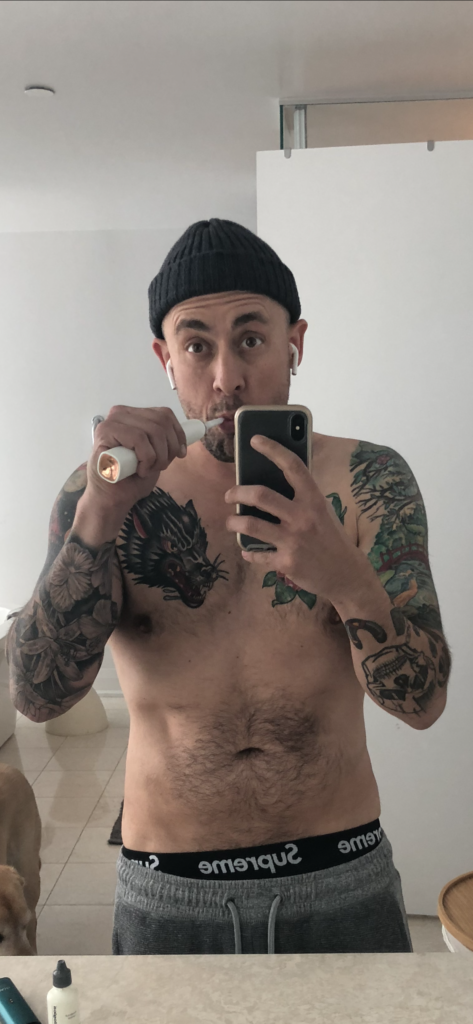
Describe the ultrasound
The ultrasound is actually nice because there’s a gliding gel they slide over you, so it doesn’t feel like you’re enclosed in anything. They rub the gel on your chest, and that’s that. They press down a little bit, but there’s no real pain.
How were the scans?
The scans didn’t scare me. I think I was in a whirlwind of everything happening so fast and trying to understand what was going on. I feel like that’s the thing.
When you’re in it, it’s a lot different than when you step back and think about everything you went through. You just get into this mode of, ‘I’ve got to do this.’
You’re just surviving at that time.
Describe the CT scan
The CT scan is different. If you’re claustrophobic, that may be an issue, but it’s more lying flat and being moved back and forth automatically through the machine. I didn’t find that that big of a deal.
Describe the PET scan
There was a very weird feeling with one of the injections (the contrast dye) that they give you for your PET scan. The guy was younger. He warned me that it would make me feel like I peed myself, but not to worry. I wouldn’t pee myself.
He ran me through the scan, and sure enough, I felt like I had peed in my pants. I didn’t, but it’s a weird feeling you get. There’s also that metal taste you get in the mouth.
But again, there’s no real pain. It’s just obviously a little bit uncomfortable going through all of that. Short of the biopsy, that was the only real pain I felt.
How did you pass the time in the hospital stay?
I have always had a rule in life to never look online. Don’t self-diagnose. Trust me on that. I never did. The only time I looked online for the entire 2 weeks I was at the hospital was once I got my diagnosis. That’s only when I first researched.
There was a toss-up if I had non-Hodgkin’s or Hodgkin’s lymphoma, large B-cell, and they thought I might have that. I knew that was bad and it was worse than Hodgkin’s lymphoma.
I didn’t want to put myself in a situation where I was getting anything else in my head. I was stressed out enough as it was and scared out of my mind, so I didn’t look online.
I eventually got my own private room and was as comfortable as I could be, keeping in mind that I was also dealing with my arm. I couldn’t lift my arm above my head. It felt like it was 900 pounds. I’m feeling swollen, scared and many different emotions. The stay itself wasn’t bad.
What was the hardest point during this time?
I’ll preface this by saying I’m an emotional guy, so if you see tears during this interview, that’s who I am. I’m okay.
Something that haunts me to this day is the look my kids would give me every time they were at the hospital and were going to leave. The look they gave me each time haunts me to this day. Just thinking about my kids wondering if they’d see their dad again was not something a child should go through.
I know a lot of people say, “Oh, your kids will be tougher and grow stronger from this.” They didn’t need to go through this. Their innocence was robbed by having one of their parents possibly die.
For the period of time I was in the hospital without a diagnosis, that’s what made it really painful and caused all the damage that it has.
I have such a crazy bond with my kids, and having to go through that, I can’t say enough how grateful I am to have them. We still are picking up the pieces of the family from the fallout from that. There’s very much PTSD in some way.
»MORE: Read different experiences of a cancer diagnosis and treatment
How did you tell your kids about the cancer?
I can’t necessarily say what worked for me will work for everyone, but I’ve always been very open with my children. I’ve never sugarcoated anything.
I talk to my kids like they’re adults. I don’t baby my kids. We have a friendship, as well as me being their dad. I’m still their friend as well.
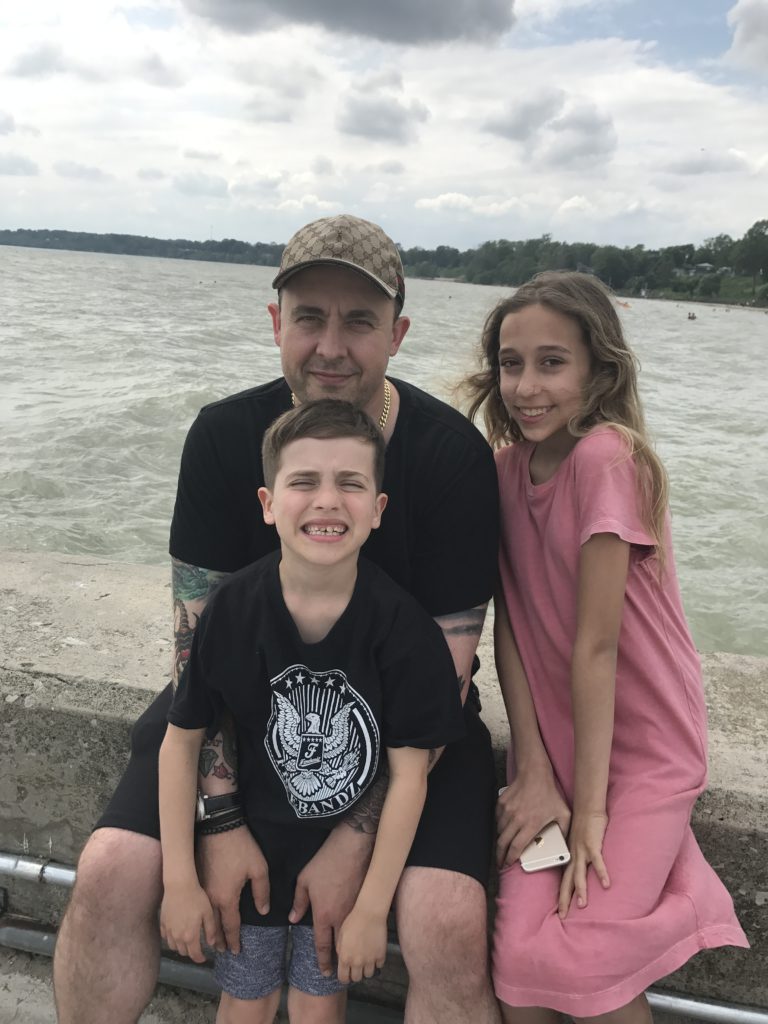
In this picture, you can still see the bloating of my face from the prednisone (steroids). I can’t say enough about these two. They were the sole reason I wanted to get better from all this. It was for the two of them.
I don’t know if there’s a right or wrong answer. I think from my perspective, with Hodgkin’s lymphoma you have such a high survival rate. I wanted to be open. They needed to know why I was in the hospital. They didn’t need to have to worry about anything anymore.
Once we had the diagnosis, I was fairly open with them on what was going to happen and what the treatment plan was, and that I was expected to get better and was going to beat this.
How old were your kids at the time?
My son was 7, and my daughter was 12 or 13. I had to remain tough as much as I could for my kids. I’m fortunate I have a great group of friends around me I was able to lean on.
Frankly, there were quite a few nights I cried myself to sleep in the hospital. I’m going to be honest about that. I was finally, for once in my life, not in the driver’s seat or in control of my life. That was a weird feeling.
How did you process the cancer diagnosis?
I didn’t look online, so I wasn’t as well-versed about the different type of Hodgkin’s. I knew the non-Hodgkin’s sounded worse. When I heard the news of the diagnosis, I’m a person who likes to research and understand. I was emotional but not surprised.
I knew I had cancer, so in some way, it wasn’t like, “You have cancer. Oh my god.” It was more like, “Okay, so this is the type of cancer I have.”
»MORE: Patients share how they processed a cancer diagnosis
What were the first treatment decisions?
I was taken from internal medicine to the cancer center that’s attached to the hospital. We’re very fortunate in Canada. In Toronto, there are two of the top cancer centers in the world, the Sunnybrook-Odette Cancer Centre and Princess Margaret Cancer Centre, which are two leading research hospitals. I was at Sunnybrook-Odette. Sunnybrook is the name of the larger hospital, and Odette is the name of the cancer center.
I was wheeled over to my hematologist, and she gave me the facts. I came out of that appointment with a simple, “All right, we know what we have to do to get this done.”
It was a sense of relief that now I had regained a little bit of the control. I knew what I needed to do. I was diagnosed. I had an 85% chance of survival. In my head, I was like, ‘You have to screw this up! Your odds are great. You’re going to get through this.’
That’s the only thought I had from that point on. I knew it’d be a bad, rough road, but I also knew there was going to be a light at the end of the tunnel.
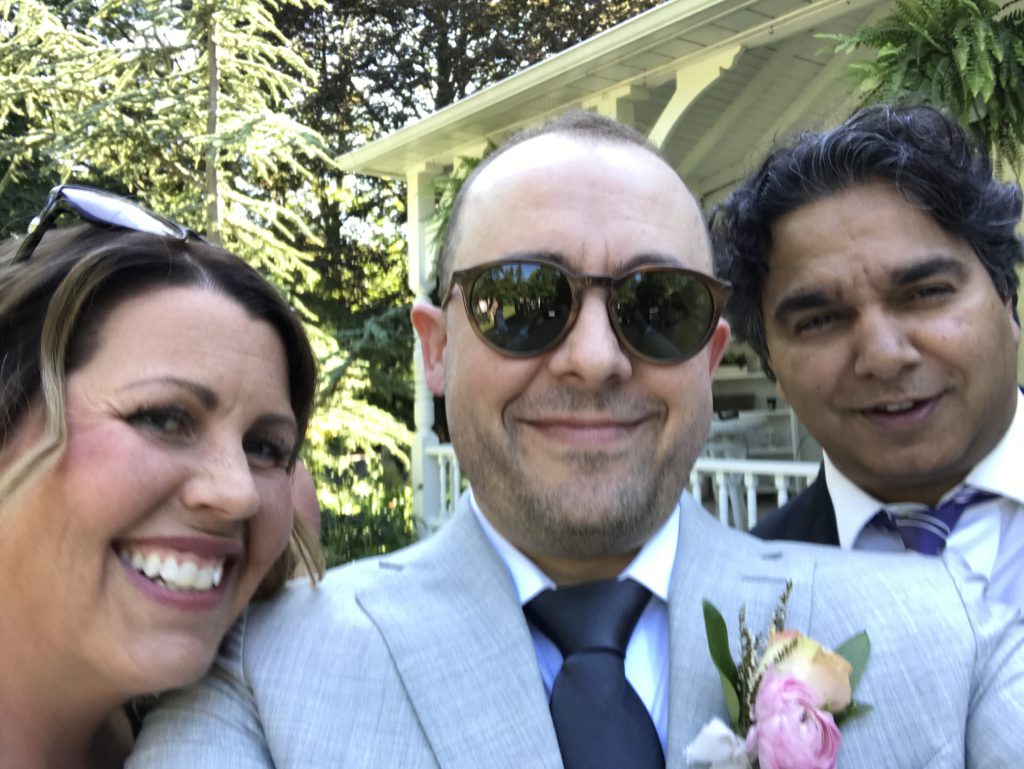
Did you break the news to loved ones?
Anyone who mattered to me knew about the cancer diagnosis, including my friends and my family. I’m very close. I have a huge group of friends. I’m close with my family. Everyone close to me knew.
I was very open about that. I felt by putting it out in the open, it made me feel better. It kicked the elephant out of the room. Maybe it’s just something with having any level of control, but I controlled the narrative about what was going on. I shared information regularly with people, highs and lows.
I had several people who visited me in the hospital when I was here for the initial 2-week period. I shared everything with everyone.
There’s a lot of sitting and waiting around in the hospital. I can type pretty fast, so I was in communication with everyone on a regular basis.
»MORE: Breaking the news of a diagnosis to loved ones
Video: ABVD Chemotherapy & Radiation
ABVD Chemotherapy & Side Effects
How did the oncologist describe your treatment plan?
We talked more about the prognosis and how everything would work. I don’t think I got that great of detail about the chemotherapy treatments.
I think the pharmacist who was brought in gave me more of an update. They talked about the various medications I’d have to take and how they’d work for me. It was a bit of a surprise.
Warning: you may get sick of your favorite foods
The day before you go for your first chemo, don’t eat any food that you will ever want to eat ever again in your life.
There’s a certain restaurant in my hometown I loved. On Sunday night (before going to treatment), my friends picked me up for a bite to eat. The smell of that food, to this day I think I could probably get sick if I walked by and smelled that restaurant.
I know everyone wants to bring little snacks. If there’s something you enjoy eating and have for a long time, have your first chemo and maybe not bring that food around, just to make sure you don’t have an adverse reaction.
I’ve heard it’s similar to the way some women crave certain foods or don’t like certain foods when they’re pregnant. You could end up ruining certain types of foods for yourself, permanently.
Chemo nurses helped prep you for treatment
The doctor gave me a breakdown of the treatment. She didn’t really talk about how I would feel going through it. The chemo nurses did that at the hospital when I started treatment. They did a good job of explaining further details. I learned the most about the process from them because they were definitely more hands-on with that.
I’m young, and I like to chat. I try to have a positive attitude, so I developed a great relationship with the nurses. Every time I see them for follow-ups, I get a giant hug from them.
They remember me, and I remember everything about them. They were with me at some of my darkest times in my life. They’ll always have a piece of my heart.
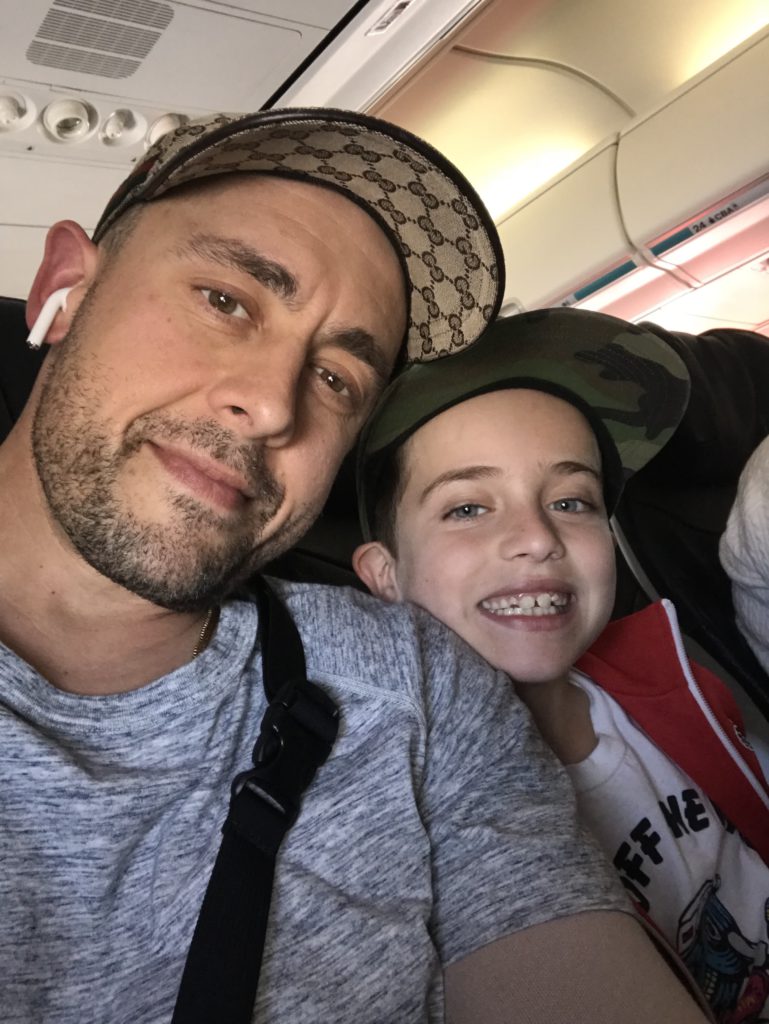
Describe the ABVD chemo infusions
It was outpatient, so I’d usually have my chemo on Monday. On Friday before, I’d have to go up and get my blood work done just to make sure my levels were strong enough for me to be able to take the chemo. Then I’d usually be there 3 to 4 hours.
The weird part about it is this is supposed to cure you and make you better, but when they’re wearing rubber gloves and hazmat suits and can’t get a drop on you or them, it feels nerve-wracking. It’s a little scary.
I own my own business, and part of coming through the other side of this is that I realized how I needed to take a break and appreciate things in life, versus being a workaholic.
I was still working when I was getting chemo. I was working for the 2 weeks I was in the hospital, still not knowing what was going on with me. It was in my nature, unfortunately.
I’d just bring my iPad, and a lot of times I’d have friends who’d come sit with me. It wasn’t the worst. I developed some great contacts with people who were also sitting in the chairs. Each room in our hospital would have 4 chairs for infusions.
You just talk. You’re there for that long; you’re all fighting the same battle. I developed a great friendship with one guy who was having treatment with me.
You’re part of this group. Cancer impacts everyone. It doesn’t matter who you are, how much money you make, how old you are. Everyone can be impacted by cancer. It’s the most random group of people who are put together here.
It doesn’t matter what walk of life you come from. I’ve met all different types of people. Because I like talking, it helped pass the time talking to people.
»MORE: Read our comprehensive ABVD chemotherapy info page
Did you get a port or PICC line?
I was having problems with my veins. I didn’t have a PICC line until after the fourth chemo infusion, so a third of the way through I had one put in.
My veins were really hurting. I was getting a lot of pain in both my hands. I guess they couldn’t really find my veins in my arms, so they had to do it through my hands. It was starting to be really painful. I was bruising pretty badly.
I had a PICC line in, and the last treatment I went for, number 12, it was a new nurse. She pulled out the PICC line. I ended up having to get it done by IV again.
You can feel different temperatures of the drugs through the PICC line. It’s like they’re floating through. You can feel it from all the different drugs — A, B, V and D.
»MORE: Read patient PICC line experiences
Did you like the PICC line?
Getting needles is something that doesn’t bother me. I have no problems with them. With the PICC line, I had no problem with it. I did find it a little annoying. It was nice going through chemo not to get poked a bunch of times!
I found it was a bit of an inconvenience. It sped up getting the chemo every time, knocking a little bit of time off. It was just part of the process. It was all part of moving forward and getting better. So a bit annoying, but not the end of the world.
How did you maneuver with the PICC line?
An arm out the shower sometimes. I’d hang it out or put saran wrap around it. There are also full things you can get. I tried to tape one to my body. It was a million different things.
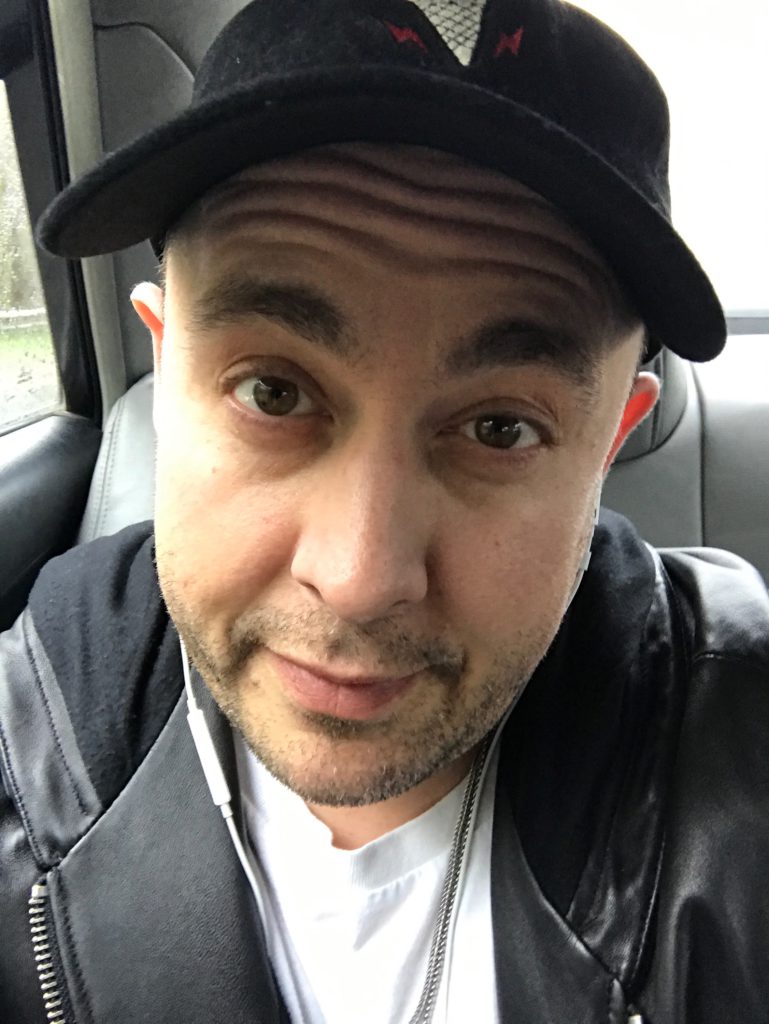
Describe the ABVD chemo side effects
Summary: Bloated/weight gain (steroids), constipated, fatigue, dry eyes (no eyelashes), runny nose (no nose hairs)
The prednisone kicked my butt. My entire body was completely bloated. Even in this picture, my face is bloated. I’m still dealing with the blood clot and some of the side effects. It’s funny to look at that picture. I don’t really see myself in that anymore.
Looking back at some of these old pictures bring back memories that, in large part, I’ve moved on from in my life. I think you walk out of the hospital feeling fine that first day. You feel a little spacey, almost like an out-of-body experience. It was a weird feeling.
I’m always amazed, and I appreciate when people are like, ‘I’m back at the gym or going for a jog.’ I was not getting out of bed at all. I was not getting out of bed.
There was the prednisone and then the medication and pills that then make you feel constipated, not great. The first couple of days I was home after the infusion, I was toxic.
That meant I had to use the restroom downstairs. When I brushed my teeth, I had to be careful I didn’t get my toothpaste anywhere, and I couldn’t kiss my kids or my wife.
I couldn’t do anything. I felt like I was toxic, which I was, but it was a weird feeling not to be able to hug my kids or anything like that.
I didn’t get any mouth sores. What I found was when I started to lose the hair on my body, my eyes got really dry and my nose wouldn’t stop running.
You’d be surprised how important nose hair is, actually, until you don’t have it. It can be difficult to not have nose hairs, that’s for sure.
Some of the other medication that I was on had other impacts on my body. I was on 2 really strong antibiotics for a while. They don’t just kill the infection; they kill all the good bacteria in your belly, too. It really messes with you and your digestive system. I’m not a big fan of antibiotics unless they absolutely need to be taken.
»MORE: Cancer patients share their treatment side effects
What helped combat some of the side effects?
Before I left the hospital, I started to make sure I took stool softeners. You have to be proactive and figure out what works best for your body, but I don’t think keeping yourself constipated is the position you want to be in. You’re already in an uncomfortable situation. You want to do what you can do.
Describe the hair loss
I didn’t even allow my hair to start falling out. I have a friend who is a hair stylist. The week of my first chemo, after I felt better, I went to his salon, and he shaved my head.
From there, this is my permanent hairstyle now. I know everyone talks about how great their hair grows back and how thick and curly it is. My hair never grew back, so this is my hairstyle for the rest of my life. Thankfully, my head is an okay shape!
»MORE: Dealing with hair loss during cancer treatment
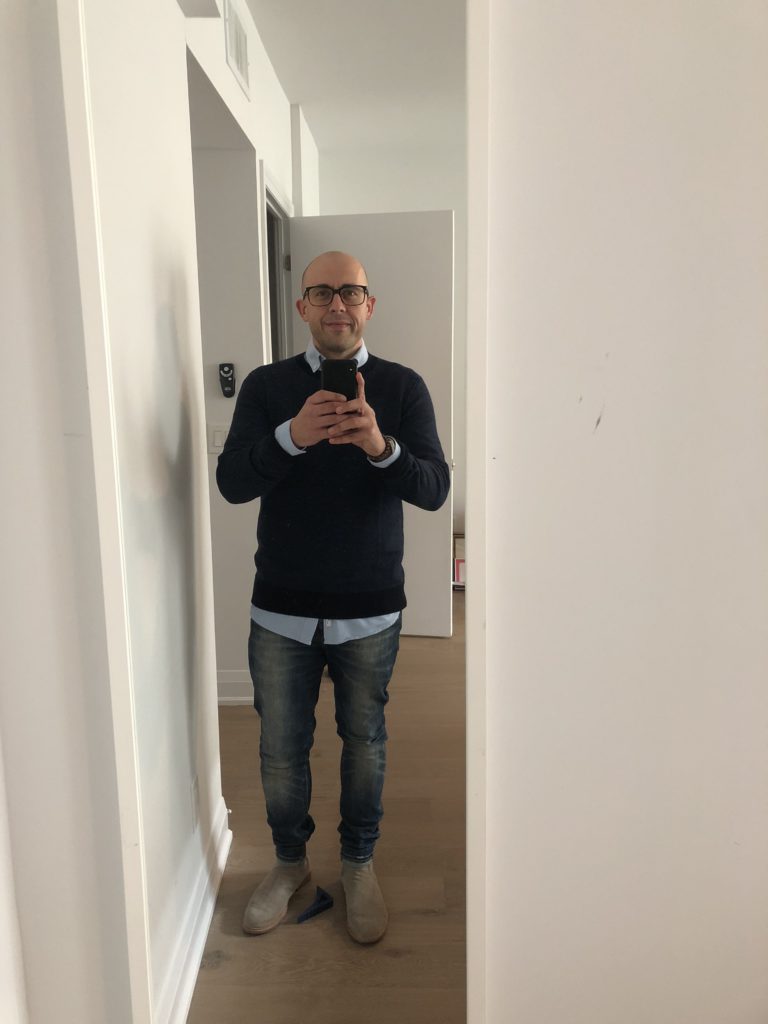
Describe experiencing the bleomycin lung toxicity
I first noticed a real heaviness in my chest, and I felt like I had a really bad cold. I was worried I was going to get pneumonia. Chemo started in June. August in Toronto is pretty hot, 80s to 90s. I took my son swimming at the pool.
I got out of the pool, and though it was hot outside, I couldn’t stop shivering. It developed into convulsions. They’re called rigors. I had a crazy high fever, too.
Over a 3-week period, I was in and out of the emergency room 4 or 5 times. That’s when they put me on really strong antibiotics. They thought I was having a reaction.
It turned out that it was bleomycin lung toxicity. That was something that I had been researching and brought to their attention versus them bringing it to my attention.
Once they finally listened to me and we did some breathing tests and scans on my lungs, it was determined I did have the bleomycin lung toxicity, so they removed that from the regimen. It seems chemo is pretty successful even removing the B, or bleomycin, from it.
The last time we had it, I think they loaded me up with Benadryl and gave it to me, and I still had that reaction. They had to wheel me from the cancer center to the emergency room again. It was a pretty rough experience for about 3 to 4 weeks in August. It was a very, very dark time for me.
That was the one time I actually felt like giving up. That was the one time where I didn’t want to keep going on with it. I had such a crazy fever, and then I’d get these crazy convulsions.
It was terrible. I felt like I was going to die. At some point I thought, “If this is going to keep going on, I think I want to die. I don’t want to keep going through this.” It was so terrible. It was the worst medical experience of my life.
They knew I had asthma. I was on an inhaler when I was in the hospital for even the first 2 weeks in the hospital during testing.
It wasn’t until the bleomycin lung toxicity event that a respirologist joined my medical team, along with the hematologist. That’s when we started to put a plan in place.
Low and behold, when they took the bleomycin out, I didn’t have those problems again.
Then it was like mid-September, and I was like, “All right, I’m feeling alive again, feeling good again. Let’s just get through this. We have 2 months left.” So it was a big change after we took the bleomycin out of the regimen.
When did you learn you had no evidence of disease (NED)?
It was mid-December when I did my PET scan. A few days or a week later, I got a call that it came back clear. One of the happiest days of my life, excluding the births of my children. It was a rush of positive emotion.
It was a long haul to get to that point. I knew I still had not only some radiation to go through, but I also had a hip surgery I needed to have done, separate from the cancer, as soon as treatment was done. It was the first big hurdle I needed to get over to get my health and life back on track.
Radiation Therapy
What was the radiation treatment plan?
18 blasts of radiation total. It was almost daily over about 3 weeks. I know a lot of people find radiation to be challenging. For me, I had already heard the good news about remission, so it was more like they were doing this to make sure the cancer didn’t come back. I was all for it.
It was a bit awkward. I was in a machine where they were making a mold of my body. Out of all the tattoos I have on my body, those are still four of my favorite ones. There’s an x- and y-axis one to line up the lasers.
It was the home stretch to get everything done.
Describe the actual process of radiation therapy
It took longer to set the machine up to make sure it was exactly right than it was to actually undergo the treatment. It is daunting to look at because it looks like you’re going into some weird space vault, so that’s the weirdest part about it.
To me, I didn’t have any pain or anything from it. There was a sense that you realize the power of that and what the repercussions of getting radiation are. That was in the back of my mind, that a secondary cancer could be down the road by having this radiation.
They were pretty pointed on the mass on my chest, and I had a mass on a lymph node in my neck, so those were the only two areas they directly targeted for radiation. It wasn’t like my entire mantle was blanketed, so I felt a little bit better with that.
What were the radiation side effects?
There was a general feeling of being a little rundown from the radiation. That was the only real side effect. I never got the radiation burns that I know some people do.
My partner, who’d gone through breast cancer, talks about how bad her skin burned. I never had any of that. It was also very targeted, and it was in and out.
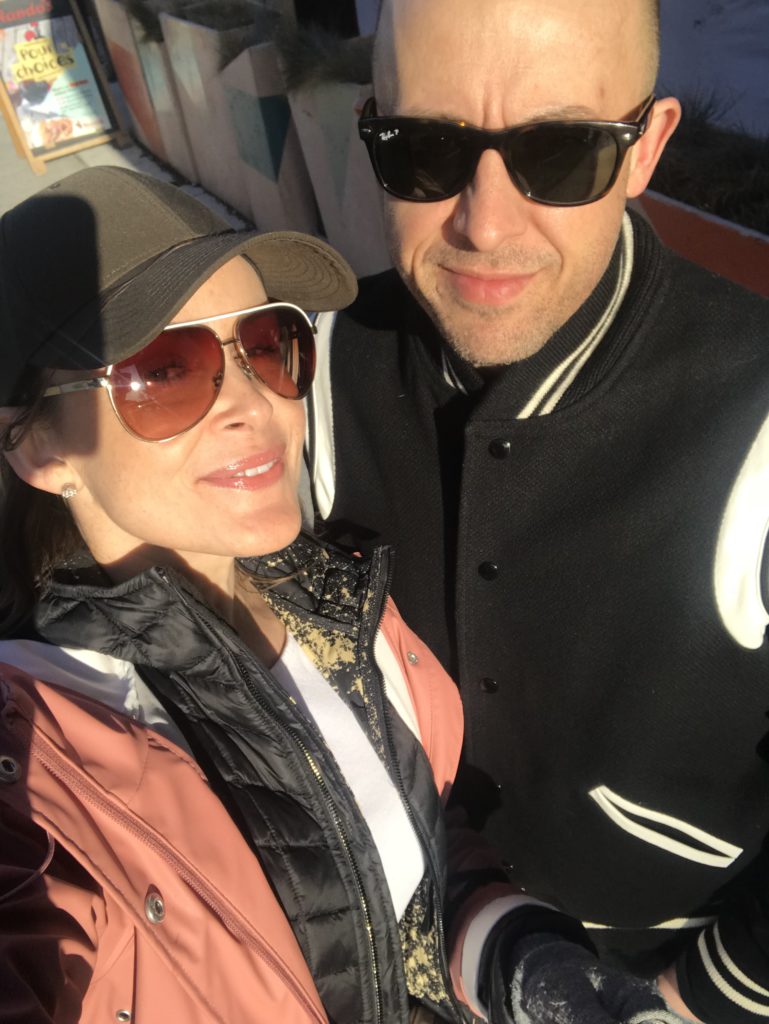
It was more emotional to see others in the waiting room
I was more emotional with some of the people I saw. I saw people who were battling brain cancer. You’d sit in the waiting room and see that. That hit me a lot more.
I also, in some ways, felt a little bit guilty that I was doing this and was better, already free of cancer, while other people were doing this as a last-ditch effort to prolong their lives or give themselves a little bit better quality of life.
There was also this crazy rush being a hypochondriac. Unequivocally for the first time right now, I knew that there’s no cancer in my body. It was a crazy feeling that I knew that I was cancer-free. I had tests done to prove it.
The radiation was a really non-event as far as how it impacted me. But I think it was more the emotional part of it, including the guilt I was feeling watching people.
To this day, going to the hospital impacts me emotionally, seeing people fighting the fight who may not be in the same position or be as fortunate as I was. That really impacted me and plays with my emotions big time.
Video: Jason’s on Navigating Life with Cancer
Reflections: Navigating Life with Cancer
Being your own advocate as a patient
Doctors are human. It’s not a perfect diagnosis every time, so you do need to advocate for yourself. I think that’s a lot of times how people get diagnosed initially, when they advocate for themselves.
Even my partner is a breast cancer survivor and had to go to 3 different doctors before the lump in her breast was taken seriously because she was in her early 30s.
That is a big part of this. You know your body the best. If something doesn’t feel right, you need to advocate for yourself and don’t stop at the first answer you get.
How has it been dealing with survivorship?
I’m not sure what the U.S. healthcare system is like, but the Canadian healthcare system is great. It does a great job of getting you healthy, but then you essentially are pushed out the door and left to try and pick up the pieces yourself.
Trying to pick up the pieces and take a step back to be like, “Holy smokes, I could have died.” It was such a whirlwind. When you’re caught up going through it, you have this mentality of, “I just need to get through this. I’ll deal with everything after. I just need to get through this.”
You make it through the other side and then have no idea what the heck you’re going to do. How do you pick up the pieces emotionally?
Thankfully, I’m in touch with my emotions, but I had this overwhelming sense of, ‘Am I going to get sick again? I have a cough, what does this mean? Am I getting cancer again? Do I have it again?’
It drove me to the point where I was starting to lose my mind from it.
Unfortunately, I went through a separation and a divorce with my wife after this. I also had hip surgery, a full hip replacement surgery, that needed to be done from an old soccer injury I had when I was 30. Getting past the hump of cancer was the first of 2 steps to get my life back.
I promised myself when I was going through treatment that I was never going to be unhealthy again. I was never going to be unhealthy and put myself in a situation where I was overweight or didn’t take care of my body. So a few months after I stopped radiation treatment, I fought with the surgeons to give me the hip replacement surgery.
They were not comfortable giving me the surgery because I had just gone through chemo and radiation, but I talked them into it after 3 delays. That was the final hurdle that I needed to physically start to get myself better so I could ride a bike, go to the gym, and start to have some physical activity in my life.
Prior to that, for the last 10 years since I’d injured my hip in my 30s, I didn’t do much physically because I was in a lot of pain. I’d have a hard time even tying my shoe.
I put on a lot of weight. I had been skinnier in my teens and 20s. In my 30s, I’d gained a lot of weight, and it was because I couldn’t do anything physically without there being a lot of pain.
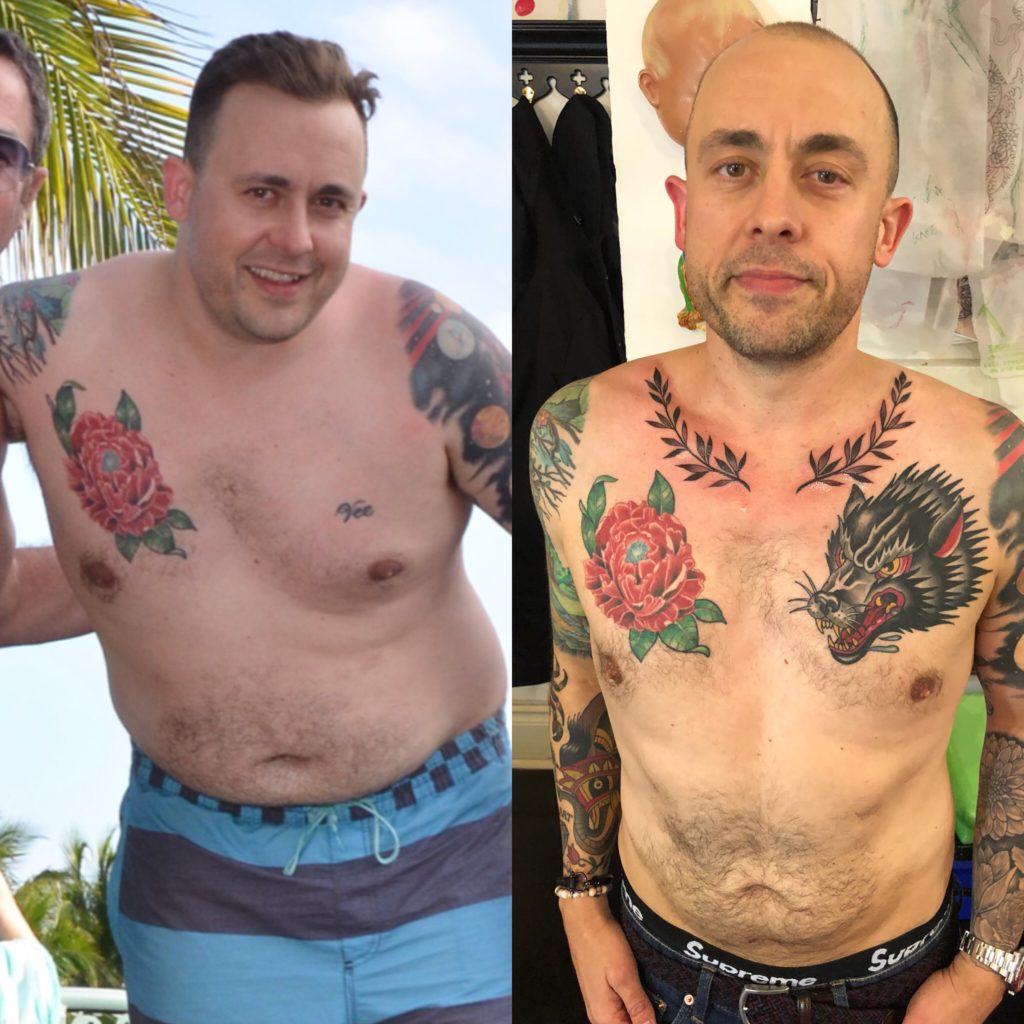
The physical recovery was easier than the mental health
This is not what you’re supposed to do to get your hip replaced, but it got to the point where I was already riding 15 kilometers on my bike, and it was a pretty rapid progression to get myself back into shape physically.
The mental part is what I started to suffer. One of the biggest challenges I had was somehow coming to terms with what had just happened and somehow being comfortable knowing that we have no idea what the future holds.
But what we do know is that there is a part of this that we can control. The part we can control is going to be the part I’m going to put every ounce of energy into.
Taking care of myself, not drinking, eating properly. I became a vegan. I’ve always been lactose intolerant, so I cut out meat and no dairy or anything like that.
We had a team called the Proud Marys. There were a few people on the team who were cancer survivors, including me. In Canada, we have the Ride to Conquer Cancer, which is 250 kilometers over 2 days. I dove into physical fitness headfirst.
Within probably the first 6 months of having my hip replaced, I had already dropped 40 pounds. Today I’m probably 50 pounds lighter than I was when I started cancer treatment.
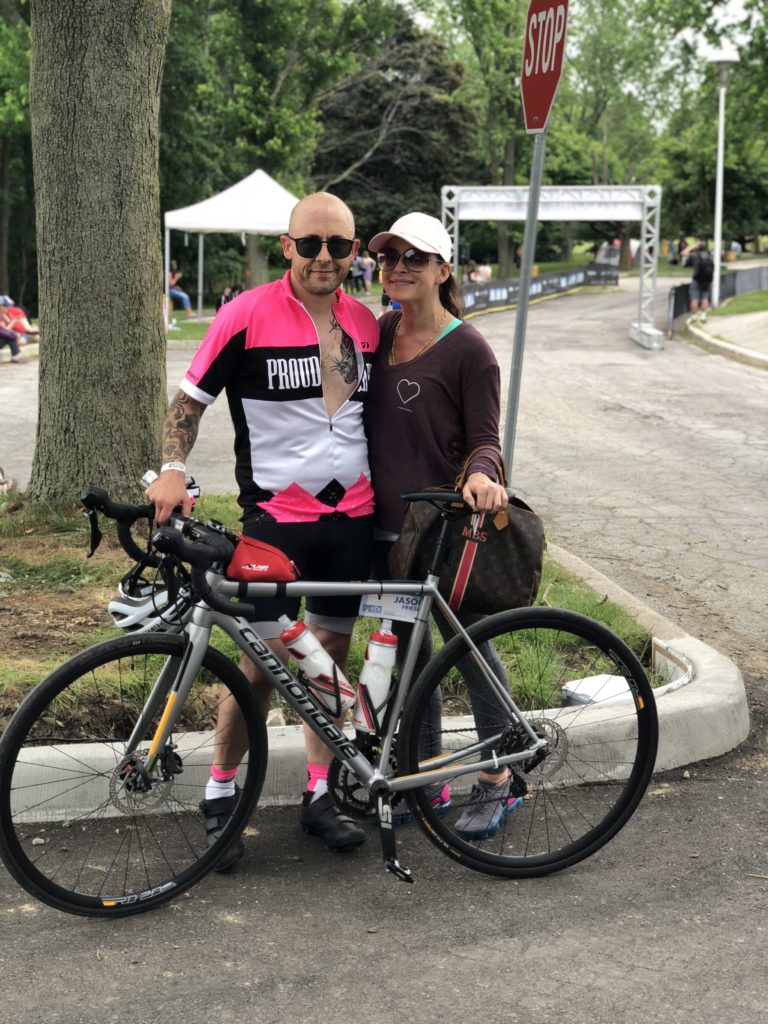
How did you move forward with your mental health?
I had a great therapist, who, for a large period of time, was the third most important person in my life after my 2 kids. He helped me come to an understanding in my head that what I can control, I will control. And the other stuff will be.
What’s in my control is taking care of myself and being healthy. I’ve found peace and solace in knowing I’m doing my part, and I’ve found this in the fact that whatever will happen will happen.
It’s not a sign of defeat or weakness to have a therapist. In fact, I think it’s a way of taking control of things. I think there’s always this preconceived notion that if you have a therapist, you must have problems.
No, I still see the therapist. I don’t see him as regularly. We have a great relationship. He’s helped me out through a lot of things in my life. It’s about having an unbiased person able to give you a different perspective outside of what your family and friends say.
I strongly suggest that even if you feel fine going after treatment, talk to someone. I don’t think you’re going to regret it. You’re not going to put yourself in any worse of a situation, I think the mental health part of it is important — you have to deal with it.
In some ways, I suffered from some PTSD. I know my kids have, especially having that experience going to the hospital, not knowing what was wrong, being there for that period of time. I needed to unpack a lot of that and be real with myself.
I also needed to go through and understand there were some changes in my life I needed to make, and I needed to be a better person. I also needed to focus my energy on things in life that matter versus a person who chose more material badges of success than really going after the things in life that matter.
It shifted my whole mindset. I’m always trying to strive to be a better version of myself every day. I know I’m not a perfect person, but as long as I’m moving forward and improving myself, that’s the best that I can do.
How did cancer impact your relationships?
For the longest time, there was a general sense of unhappiness on both of our sides, but also this understanding or expectation that this is just the way it is.
I think a lot of people stay unhappy in relationships longer than they should. They’re doing themselves or that person or the children in that relationship a disservice by being there.
It’s unfortunate that my relationship didn’t make it through the other side of this. We are in a great spot and do an awesome job co-parenting our children. We each have our children one week on and one week off; it works well. Not going to say there were not some bumps in the road, but I’d like to say we’re in a good spot now. We have a good understanding.
She was supportive of me through treatment, and I’ll always be grateful for that. She’s the mother of my children. I think being a cancer survivor and coming through the other side, my priorities changed and what I needed changed.
I don’t hold her accountable for that. I realized what I needed and my expectations changed. And it’s a tough realization to come to, but when you come through the other side and realize how precious life can be and how short life can be, it makes you reevaluate.
I had some friends in my life who were toxic and who were cancers in my life. I had to move on from those people as well. I’m happy where I am now. It was a long road of self-discovery.
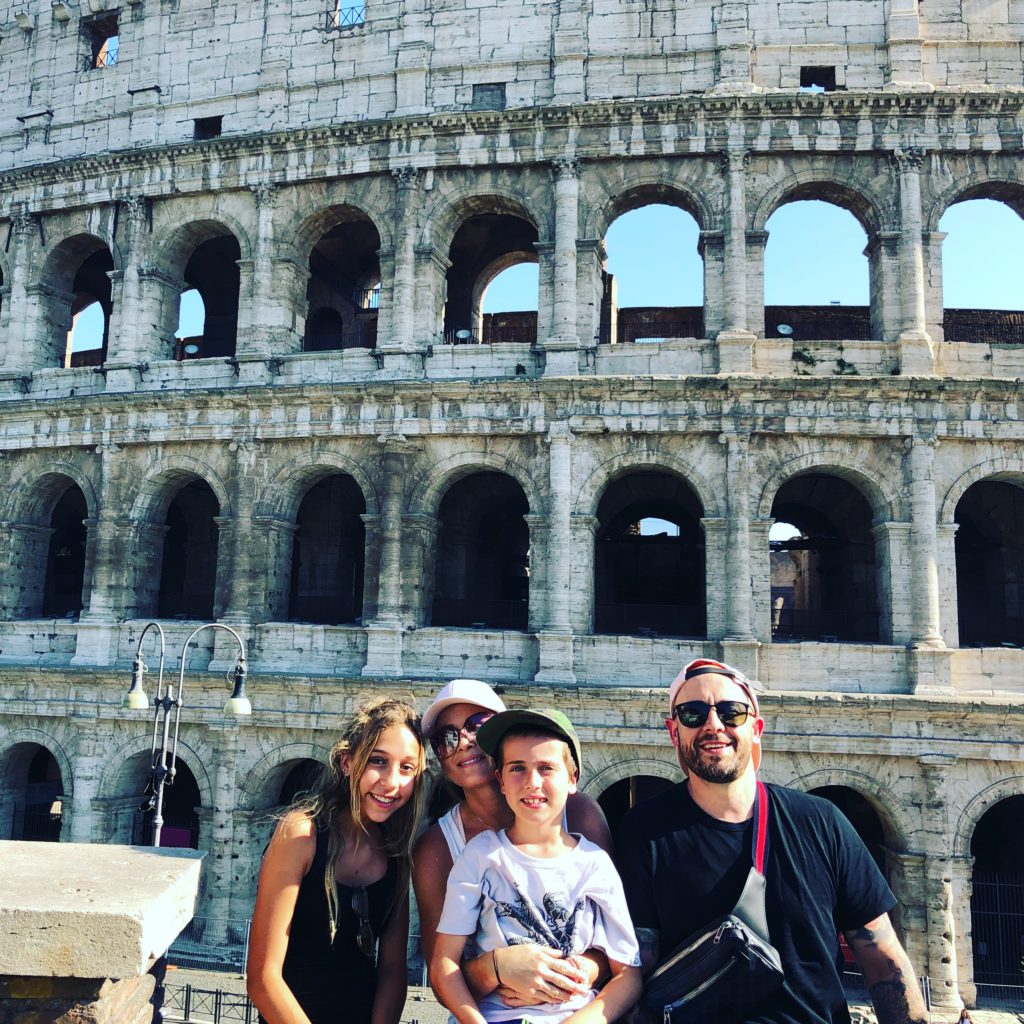
Frankly, I don’t think I would be the partner I can be today to Molly, my future wife, had I not gone through this and had I not grown as a human being in the ways that I needed to.
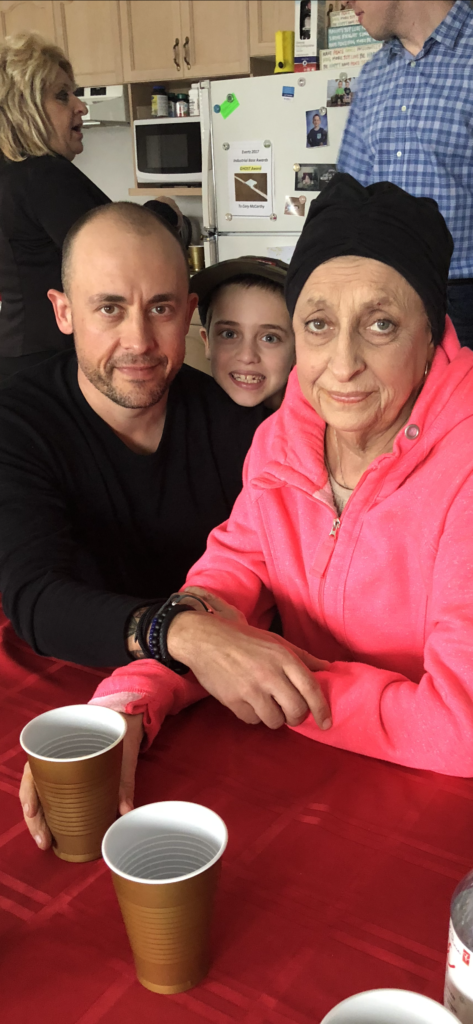
Your mom was diagnosed with lung cancer shortly after your diagnosis
Being so caught up in your own treatment is a different situation than being a caregiver.
This picture is Christmas 2017, the last time I saw my mom and the last picture anyone ever took with her.
She was not given the same positive diagnosis. She knew that she was on the way out, but she fought until the very end. It’s crazy to me going through this and then to also watch my mother go through this. My then-wife’s father also went through cancer, so two of my immediate family members were going through the fight of their life together with me.
This is a heartbreaking picture for me to look at. It still makes me tear up thinking about it. It was seeing her — I had not seen her for a month when I saw her at Christmas. When I saw her, I knew that was probably one of the last times I’d see her. A month later, she had passed away.
How did you process the grief as you went through treatment?
I carry a lot of guilt with my mom just simply from the point of view that I got better and had to focus on taking care of my kids, taking care of myself, and my family in the stuff I was going through.
As much as I was around my mom, I wasn’t around her as much as I think I should have been. She didn’t hold that against me. She appreciated what I was going through as well.
I can imagine my mom was much more worried about me in the end than she was about herself. That was just her caring disposition of a human being.
She was such a big personality and had tons of friends. At her funeral, my dad and I joked that there were 8 different women there who’d be upset to find out they weren’t my mom’s best friend. She was that type of person. She loved everyone and was a great person.
It’s hard not to find someone impacted by cancer, unfortunately. She was 61 when she passed and had a lot of life to live still ahead of her.
Last message to other people dealing with cancer
The message I can share is while you’re caught up in treatment, it seems like cancer is never going to come through the other side. You’ll have fears and concerns.
What I want to say is that it does get better. Life does get better. If there’s any positive that comes through this is it will make you a kinder, gentler person who appreciates the things in life that matter versus things in life that you thought mattered before you went through this.
I don’t think it’s possible for you to physically go through this without coming out the other side a better person, a kinder person. I know I have completely changed, and I’m always striving to improve myself. I’d like to think that I’m continuing to evolve into a better version of myself every day.
I honestly don’t think I’d be on this same path to long-term health had I not been sick. I wasn’t a person who took care of himself before or ate properly, maybe drank too much, didn’t get enough sleep, didn’t do any physical activity.
The one thing this taught me and pushed me through was that I needed to make some big changes. Now I honestly think having gone through cancer, I will live a longer life than had I not gone through this.
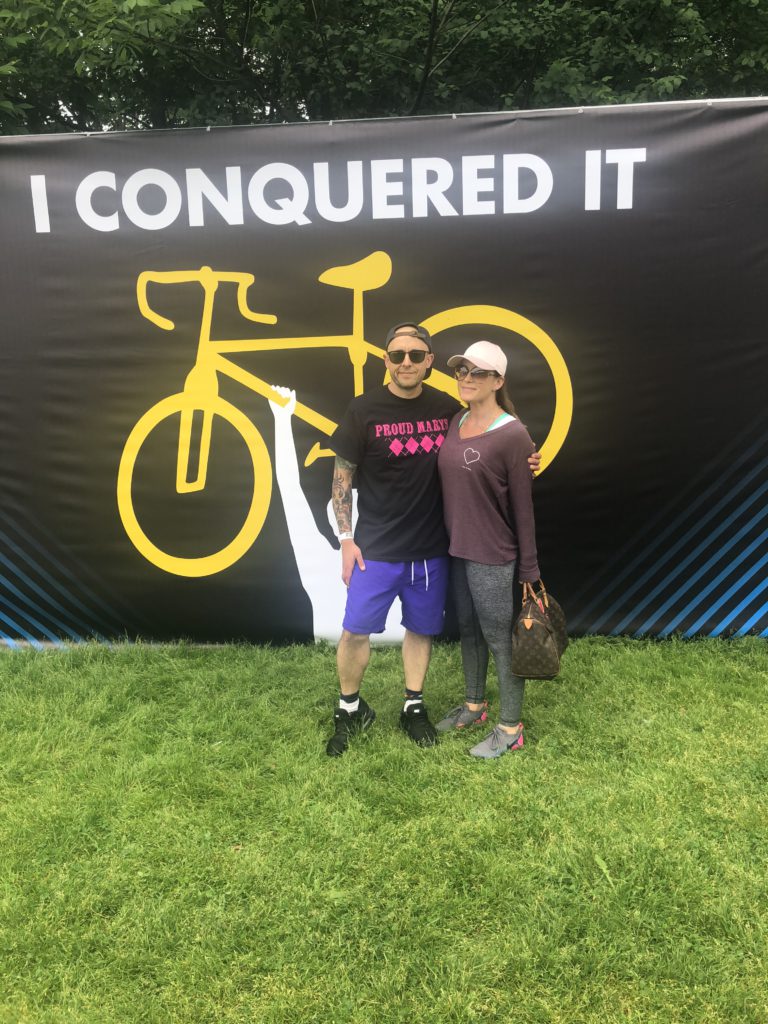
Inspired by Jason's story?
Share your story, too!
Hodgkin’s Lymphoma Stories
Jessica H., Hodgkin’s Lymphoma, Stage 2
Symptom: Recurring red lump on the leg (painful, swollen, hot to touch)
Treatment: Chemotherapy
Riley G., Hodgkin’s Lymphoma, Stage 4
Symptoms: • Severe back pain, night sweats, difficulty breathing after alcohol consumption, low energy, intense itching
Treatment: Chemotherapy (ABVD)
Amanda P., Hodgkin’s Lymphoma, Stage 4
Symptoms: Intense itching (no rash), bruising from scratching, fever, swollen lymph node near the hip, severe fatigue, back pain, pallor
Treatments: Chemotherapy (A+AVD), Neulasta
Brescia D., Hodgkin's Lymphoma
Symptom: Swelling in the side of her neck
Treatment: Chemotherapy: 6 rounds of ABVD
